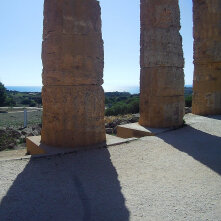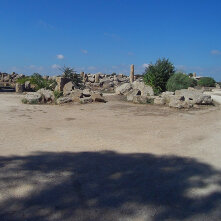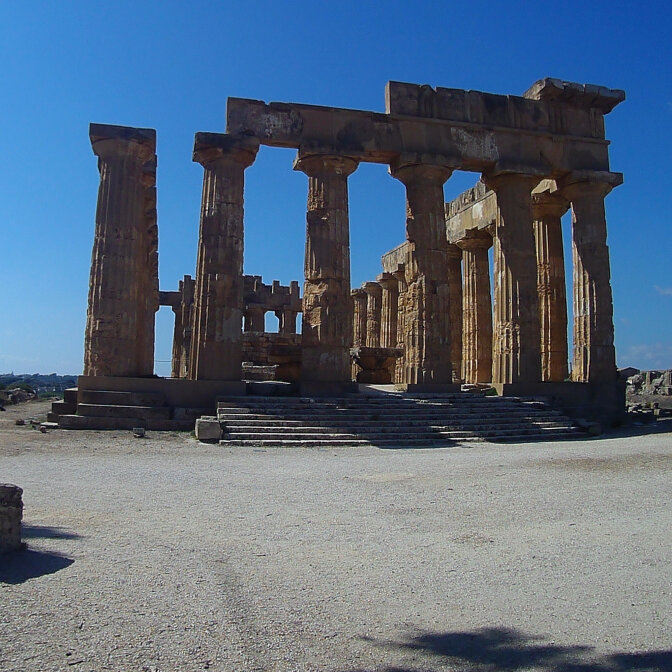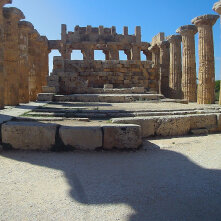The Cerberus of Selinunte
The Cerberus of Selinunte
Today was an easy day, we did a simple loop ride in the Menfi area that took us up into the hills above the town and then to the Greek ruins in Selinunte.
Now, I am certain what I am about to write will seem strange, but several years back when rereading the first few cantos[1] of Dante’s Purgatorio I was struck by the contrast between the deepest pit of hell from which Dante had just ascended to the shores of the island of Purgatory. There was something about the description where I envisioned myself on that shore, feeling the ocean breeze, smelling the fresh air. I imagined what it must have been like to fill your lungs with clean air after breathing the stench of hell for days. Since reading this passage I have become more aware of smells, more appreciative of fresh clean air, especially when cycling.
That morning, as we headed into the hills, I was especially aware of the fragrant countryside. Again, it is difficult to express in words what that morning was like without falling back into writing clichés. There wasn’t anything necessarily out of ordinary about where we were riding, just a winding road that made its way beneath the trees, a patchwork of sunlight and shade. Yet there was something about the air that day, more than just the absence of something unpleasant, an actual purity, a greenness. I filled my lungs with it as I rode. I stopped frequently, closing my eyes, savoring the moment. Again, this is something I have done frequently throughout this trip.
As we came down off the hills making our way to Selinunte, we stopped at Porto Palo for lunch. While there were a number of places to eat along the beach, we stopped at a place that had a nice vegetarian buffet. I am not a vegetarian, but it was nice to have something a bit different. Afterward, we headed to the beach to relax for a bit. My son went for a quick swim and then stretched out on the sand to absorb the Medeterainian sun. Unfortunately, we did not have the time to enjoy the water as much as we could have. He was not terribly thrilled with me when I more than suggested that we head on to Selinunte before returning to Menfi.
Selinunte was a very short ride from the beach, which was fortunate after lunch and relaxing in the sun I was not terribly anxious to get back on a bike. This archeological site is the remains of Greece’s westernmost colony in Sicily. I thought it interesting that at one point they tried to reconstruct one of the temples. They came to realize, however, that by doing so they were probably doing more harm than good. So, they abandoned the effort.
What differentiated Selinunte from what we saw in Agrigento was the inclusion of the ruins of a city. The city sat between Cottone River in the east and the Modione River in the west. Established in the mid-seventh century BCE, Being the furthest colony to the west it came into contact with a number of non-Greek people with whom they frequently warred. Finally, it was defeated by the Carthaginians in 409 BCE. Its fortunes fluctuated in subsequent years until it was destroyed in 250 BCE by the Carthaginians while retreating from the Romans during the Punic Wars.
The history of the city is sobering. In the United States we think of ourselves as a powerful nation whose greatness will be remembered throughout history, but so far, we a just a dot on the history of humanity. As a nation, we have existed for roughly 230 years – using the ratification of the Constitution of the birth of the country – on the scale of history that is not much time at all. Selinunte existed for roughly four hundred years and few people remember it. Of course, one was a Greek colony and another a nation, but I think it does demonstrate how truly young the United States is. How short a time the Grand Experiment has been underway. How easily it can still fail.
As we wandered between the fallen walls and along the ancient streets, we were able to get a faint sense of what the city must have been like. Walking along in the heat of the day, looking out at the waters of the Mediterranian, I thought of the people who once lived and worked in the city. I imagined how a worker or slave, must have felt as he labored in the summer heat, looking down at those cool waters.
As fascinating as the ruins were, I feel compelled to admit that it wasn’t the fallen walls that caught my attention that afternoon. As anyone will tell you, I love dogs. If there is one around, it immediately becomes the focus of my attention. Unfortunately for our guide, as we left the fallen temple approaching the remains of the city, we were greeted by a dog, a cute little terrier mix of some sort. Despite my love of dogs, I am not that knowledgable about breeds. From that point on, I lost all interest in everything she had to say. As the guide droned on, the perky little pup leaped happily from one pile of stones to the next, trotting alongside our group. There were a number of geckos scampering in and out of the crevices in the rocks which the dog hunted with seemingly great joy.
Now, I know I should have paid more attention to our guide as she talked of the Carthaginians, and the Greeks, and Hannibal, and Dionysius, but you should have seen this dog. He was so damn fun to watch. It broke my heart not to be able to bring him back home with me. Then again as we departed I saw him run off with the next group of tourists with whom, I assume, he continued his antics. He’s
. Well, at least he may appear that way to all those poor geckos.
So, this was our day. Tomorrow, we head to Marsala.
[1] The literal translation of canto is a song. Dante’s Divine Comedy is divided into cantos which basically serve as chapter divisions. I am certain that those who are Dante experts, otherwise known as Danteists, will howl with this explanation.







